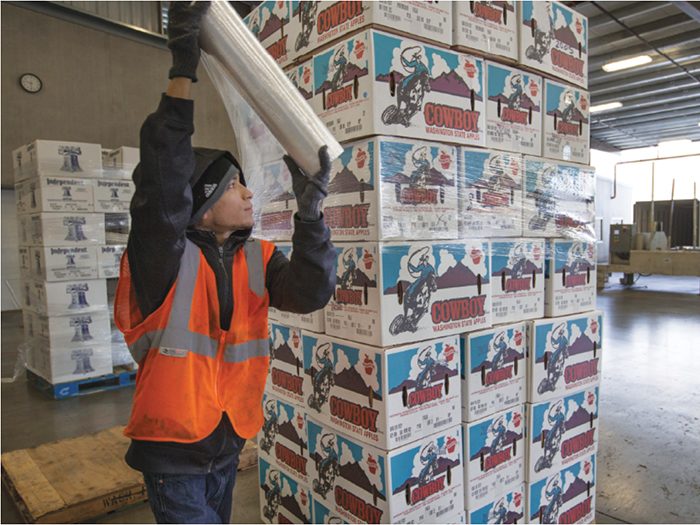Food Safety
Unknowns of the FDA’s New Rule

Anyone involved in the transportation of food products within the U.S. now shoulders additional responsibilities for ensuring the safety and sanitation of those goods.
The final rule on the Sanitary Transportation of Human and Animal Food, issued by the FDA as part of the Food Safety Modernization Act, introduced new standards for the shipping conditions of foods in open containers, the cleaning and maintenance of equipment, training and record-keeping.
In short, any food entering the U.S. distribution system — and any blemishes — will be under a magnifying glass.
If receivers notice anything about a shipment that falls short of the new standards — anything from obvious spoilage to a bit of dirt on the trailer floor — they have grounds to reject it. Every link in the food delivery supply chain — manufacturers, shippers, loaders, motor carriers, receivers and distributors — will all take on additional exposure as a result of the elevated standards.
“It’s really a two-pronged issue: liability and coverage,” said Alan Clark, senior executive general adjuster, Engle Martin & Associates. If a shipment is deemed unsuitable for consumption, who is at fault? And will standard general liability, property and motor truck cargo policies respond?
Shifting Liability
“The FDA took a position that they are not changing the law on liability, which was established by the Carmack Amendment” in 1935, said Sam Rizzitelli, transportation practice leader for the Americas, Allianz Global Corporate & Specialty.

Sam Rizzatelli, transportation practice leader for the Americas, Allianz Global Corporate & Specialty
“The Carmack Amendment will still be the fundamental law governing liability for goods in transit, but deviating from the amendment by use of contract will increase.”
The amendment states that if the shipper wants to hold a motor carrier liable for damaged goods, it must prove that the cargo was in good condition when handed over to the motor carrier, and that it was damaged by the time it was delivered to the receiver.
The new sanitary rule, while not changing the letter of the law, shifts the onus onto the motor carrier to uphold the transport instructions set by the shipper.
“Ultimately, it is the shipper’s responsibility to lay out specific conditions for the safe transport of food, but they can legally delegate that to other parties covered by the new regulation in a contract,” Rizzitelli said. “The practical reality is that the carrier ends up as the one stuck in the middle, so they have to do more in order to facilitate harmony in the supply chain around this issue.”
Definition of Loss
With this increased liability risk, the question hovering over motor carriers is, will insurance cover it?
Motor truck cargo and property policies typically cover direct physical loss or damage to goods, but the new rule blurs the definition of “direct loss.” A receiver may reject a shipment as adulterated if they see that the new sanitary standards were not met, but no firm criteria to determine “adulteration” of goods have been set.
“The practical reality is that the carrier ends up being the one stuck in the middle, so they have to do more in order to facilitate peace in the supply chain around this issue.” — Sam Rizzitelli, transportation practice leader for the Americas, Allianz Global Corporate & Specialty
Direct physical loss is usually easy to see. Adulteration or contamination is not.
“If something is stolen, burned or spoiled, that’s easy to distinguish and easy to find in your coverage,” said Steve Silverman, vice president, inland marine, Berkshire Hathaway Specialty Insurance.
“With this law, goods may not necessarily be damaged, but can still be rejected. The question is whether there will still be coverage under the insurance policy for that loss.”
Take, for example, a shipment of fresh apples. The shipper requires the trailer to be kept at 35 degrees F.
When the apples arrive at their destination, the receiver takes the trailer’s temperature and finds it at 38 degrees. That would be enough for the receiver to reject the apples, even if the fruit is not spoiled and perfectly fit for human consumption.
Coverage Challenges
Current cargo and property policies held by motor carriers likely would not cover the rejected shipment, and underwriters are struggling to adapt to the new risk.
“The new sanitary rule will change how underwriters approach the risk,” Clark said. “There will need to be changes in language and endorsements added to policies.”
Insurers will be challenged to write coverage for the broader exposure without pushing prices so high that insureds can’t afford it.
“We’re struggling as an industry to come up with language that reflects this exposure. It’s difficult because we want to protect insureds, but at the same time, we don’t want to make coverage so broad that we have to price for higher loss assumptions that would make coverage unaffordable,” Silverman said.
Only time and an influx of claims stemming from the new rule will tell how the industry will adapt to the new standards. In the meantime, expect a spike in litigation as motor carriers, shippers, receivers and insurers debate what constitutes a loss and which player in the supply chain dropped the ball.
“We don’t know what the full impact will be,” Clark said.
Risk Mitigation
As of now, there are several steps motor carriers can take to shield themselves from liability. The new rule calls for more comprehensive training and record-keeping, so carriers have to update their procedures to stay compliant, though it would be wise to implement these risk management practices regardless.
“Employees have to be aware of their responsibilities. They have to understand whether the trailer meets the specifications for cleanliness set by the shipper to transport food, and if the refrigeration system is working,” Silverman said.
The shipper and motor carrier also have to agree on how temperature will be monitored. The sanitary rule calls for a record of that agreement, written procedures utilized by the carrier to get the trailer in order, and documentation of training. Records must be kept for up to one year.
“Employees have to be aware of their responsibilities. They have to understand whether the trailer meets the specifications for cleanliness set by the shipper to transport food, and if the refrigeration system is working.” – Steve Silverman, vice president, inland marine, Berkshire Hathaway Specialty Insurance
“Motor carriers will have to keep records of exactly how they are meeting conditions set by the shipper,” Clark said. “How often is the trailer being maintained, and who is doing that work? How is the temperature being tracked and controlled?”
Carriers should also take care not to waive certain rights through contracts with shippers, such as the right to establish protocol to determine whether a shipment should be deemed a loss.
“Some contracts may appear to be in good faith but really aren’t. They may be biased in that the shipper sets the amount of damages the motor carrier will be responsible for paying, without setting a procedure to investigate a claim of contamination,” Clark said.
Motor carriers should rely on their insurer’s claims adjusters to challenge whether goods have been adulterated. Going back to the apple shipment, for example, an adjuster could take the internal temperature of an apple to show that it was not affected by the change in temperature in the trailer.
“With this law, liability will shift contractually from shippers and loaders to the motor carriers, so it’s important to understand what you’re signing when it involves shipping,” Silverman said.
“Smaller carriers may not have the staff or resources to devote to scrutinizing contracts. They sign a document because they need the load, without understanding what they’re picking up in additional liability.”
Clear communication with shippers and diligent documentation is the best way to avoid claims.
“Insurers, industry associations and transportation lawyers are all trying to grapple with the issue with respect to the underwriter’s obligation and what insureds are responsible for, so we can design an appropriate coverage,” Silverman said.
“The most important thing is that risk managers at every step of the supply chain understand the law and how it uniquely applies to them, and make sure that employees understand what they have to do to comply.” &










